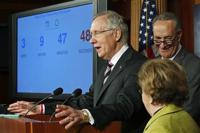By Marek Fuchs
Traders and the media, like military generals, tend to fight the last
war. In other words, when faced with a pending battle, they assume it’s
going to run the same course as the last time they took up arms.
That's why so much of the subtext for the pending government shutdown, due to possibly start next week, seems to be the previous government shutdown, which spanned over 28 days between November 1995 and January 1996. But from former President Bill Clinton's misinterpreted popularity to canyon-wide differences in states of the respective economies and expectations of the public, this go-round stands to be far different.
One item won’t change. Until the issue is settled, many blips of the stock market will be seen through the lens of the budget battle (and debt ceiling debate).
What we know
This much we know: The economy was much better cushioned for tumult in 1995. The last recession had ended in March 1991, so economic growth – a robust 3.5% in the third quarter of 1995 – was well established. Moreover, the economy was about to hit an even sharper register, thanks to the beginnings of Internet mania.
That’s quite a ways from our current state of affairs, which is fractured, at best. Rather than a well-established record of growth, we currently seem to slip between greased wheel and just plain greasy. One recent report showed rising home prices in July, while another evidenced slip-sliding consumer confidence in September. This comes on the heels of the Federal Reserve’s apparent reversal on reducing its $85 billion a month bond-buying binge.
But let’s not over-tout the comparative conditions of the economy. After all, the stock market is driven by expectations. Despite the baseline strength of the economy at the time of the 1995 shutdown, the government closing up shop unnerved the system. Though it soon recovered, economic growth slipped to 2.6% in the first quarter of 1996.
Many are assuming the same for Shutdown 2.0. Prevailing thought was set forth by a USA Today headline: “If government shuts down, economy would feel it.”
Perhaps. But the economy runs on expectations and ours have been defined down since 1995. The economic crisis of 2008 set a new standard for inducing economic turmoil. We’ve also had a full generation of political stalemate, which means we're used to brinksmanship, showboating and impasses. Moreover, this time, we already feel the dodgy effects of the government’s disappearance through the sequestration.
Further differences
The differences go further than a fizzled set of expectations, however. The fact that this generation’s partial shutdown might occur more than a month earlier in the calendar than the last one also might mitigate any impact on the Christmas selling season. In addition, there might be a hidden benefit to the comparatively unsettled world stage. With a roiled Mideast and Russia rising, attention might be taken from the shutdown, which could also lessen its effects.
By comparison, 1995 was a relatively quiet time internationally. There was no collection of revolutions in oil-producing countries. Russia was dormant. The public’s consciousness could focus with near exclusively on the shutdown.
A president’s standing is always important to the stock market and there is a preconception here, worth noting, that the shutdown might prove a boon to President Obama – as it was to President Clinton. Could be. The Republicans' ability to break their ankles by tripping over their own feet knows no bounds. But there are differences here, too.
Obama’s poll numbers recently hit a two-year low and there is an argument to be made that the stock market was already poised to suffer the consequences of his lame-duck status.
President Clinton emerged from the last shutdown a far more popular figure, but the public forgets that his political fortunes plummeted while it was happening. This was until an outburst by Republican leader Newt Gingrich over being made to sit in the back of Air Force One was reinterpreted as the cause of the shutdown. Gingrich soon appeared on the cover of a New York tabloid sobbing while wearing diapers.
A politician in diapers. Whatever portion of history repeats itself, let’s hope it’s not that.
Marek Fuchs was a stockbroker for Shearson Lehman Brothers before becoming a journalist who wrote The New York Times' County Lines column for six years. Fuchs speaks regularly on business and journalism issues at venues ranging from annual meetings of the Society of American Business Editors and Writers to PBS to National Public Radio. His recent book, "Local Heroes: Portraits of American Volunteer Firefighters," earned widespread praise. He is on the writing faculty at Sarah Lawrence College. When Fuchs is not writing or teaching, he serves as a volunteer firefighter. You can contact him on Twitter: @MarekFuchs.
Source: Yahoo Finance
No comments:
Post a Comment